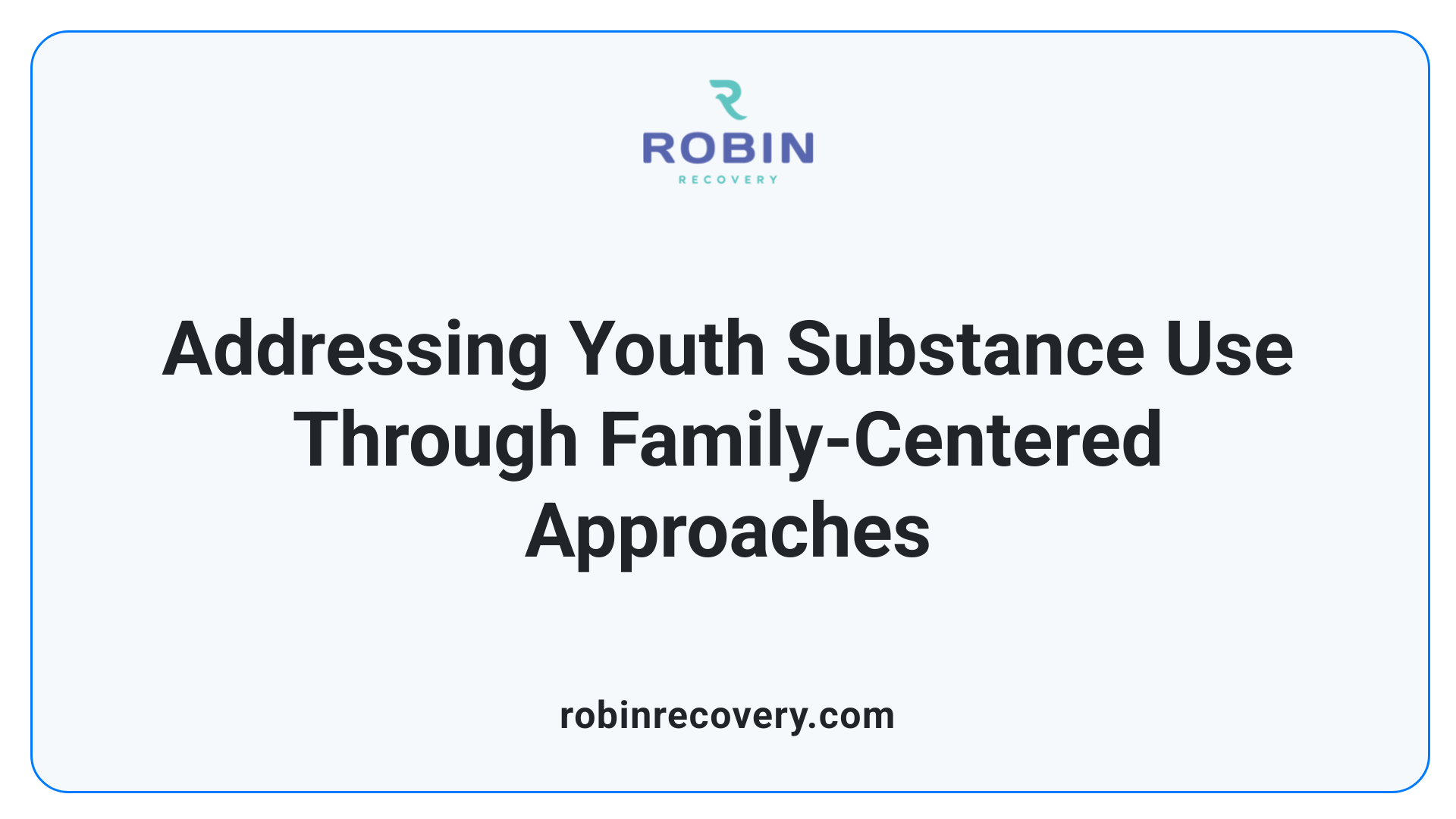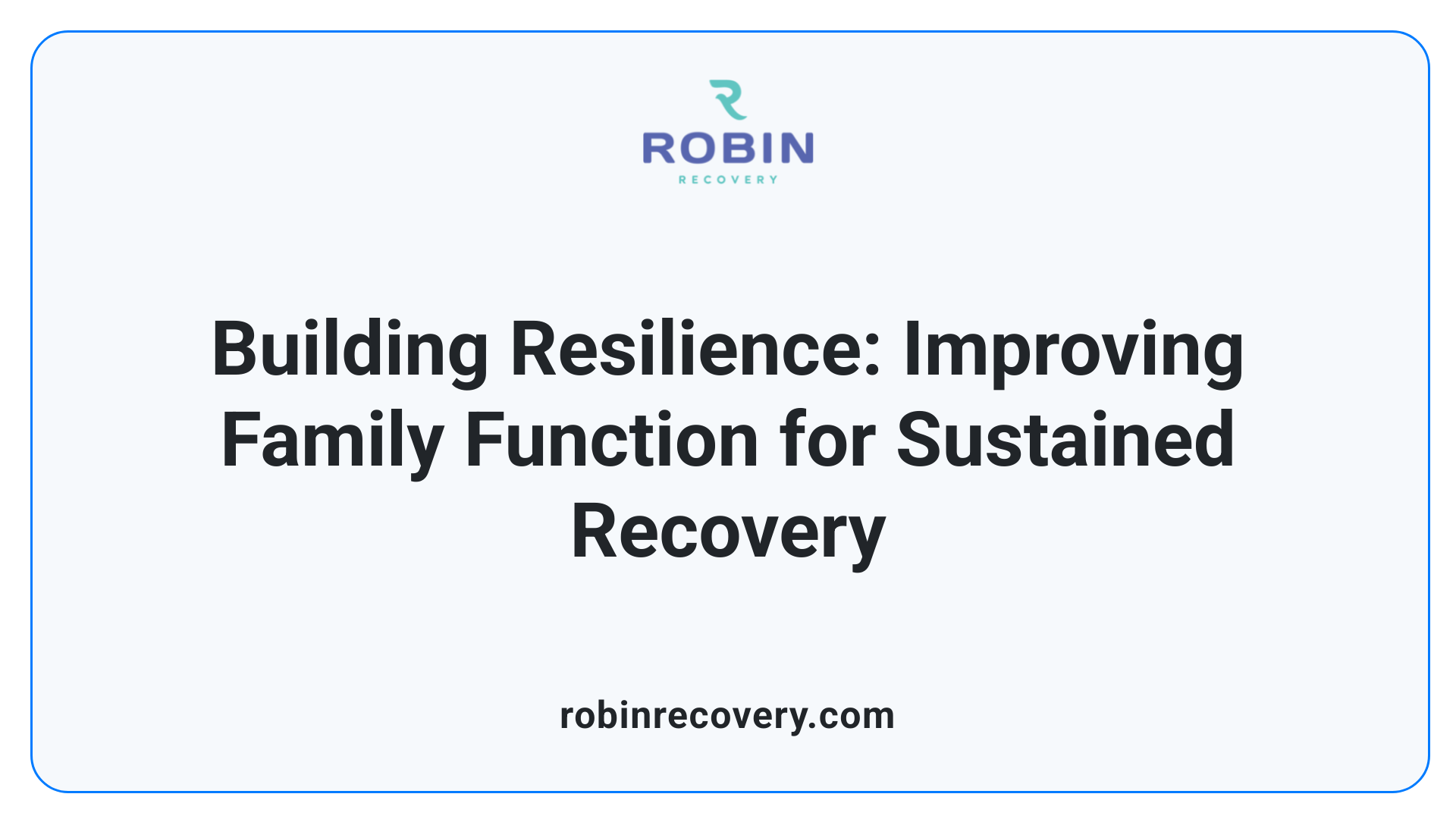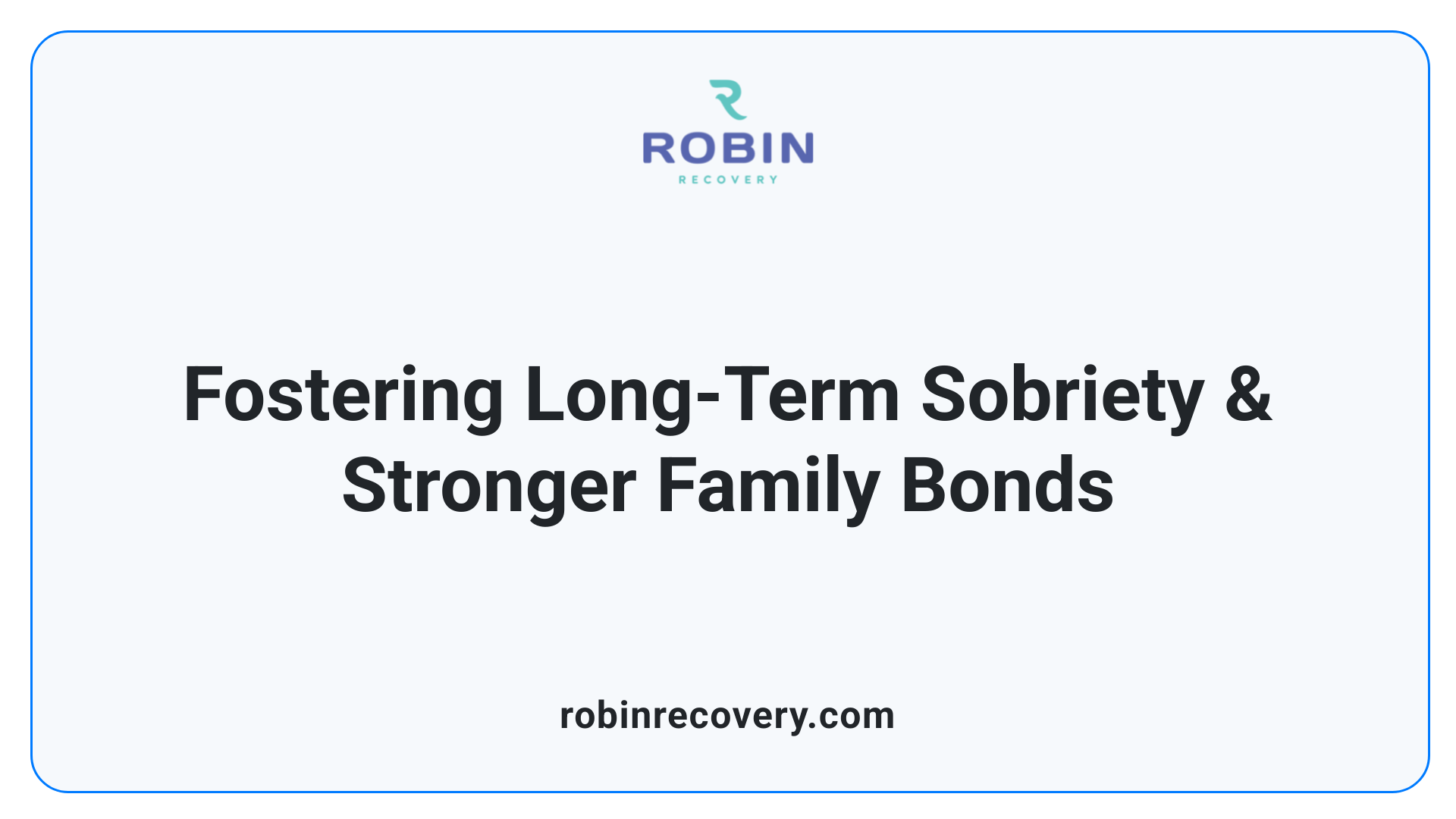How Family Therapy Helps Parents and Teenagers Address Substance Use Issues

Understanding the Vital Role of Family Therapy in Addressing Adolescent Substance Use
Substance use among adolescents poses significant challenges not only to the young individuals but also to their entire family systems. Family therapy emerges as a crucial intervention, designed to engage both parents and teens in meaningful, structured sessions that foster communication, understanding, and systemic change. This article explores how family therapy helps families confront substance use issues, the techniques employed, its role in prevention, and the pathways to sustained recovery.
How Family Therapy Addresses Substance Use in Adolescents

How does family therapy help address substance use issues among adolescents?
Family therapy plays a crucial role in tackling adolescent substance use by focusing on changing dysfunctional family interactions that may contribute to the problem. These approaches view the family as a system, where each member’s behavior impacts others, and aim to create healthier dynamics.
Evidence-based models such as Multisystemic Therapy (MST), Functional Family Therapy (FFT), and Multidimensional Family Therapy (MDFT) are structured to bring about positive change. They follow specific phases that help families improve communication, develop effective problem-solving skills, and establish firm but supportive boundaries.
Therapies like MST and MDFT actively involve family members, guiding them to understand their influence on the adolescent’s behavior. They also help address underlying issues, such as emotional distress or environmental factors, that contribute to substance use.
By fostering stronger relationships and better communication, family therapy creates a supportive environment that encourages recovery. These interventions emphasize bonding, empathy, and mutual understanding, which can significantly reduce the adolescent’s risk of relapse.
Research shows that these structured therapies not only decrease substance use among teens but also promote healthier family functioning overall. This holistic approach helps adolescents develop healthier coping strategies and sustain sobriety in the long run.
Model Focus Area Main Techniques Expected Outcomes Multisystemic Therapy (MST) Family, peer, school, community dynamics Behavior management, problem-solving, skill-building Reduced substance use, improved family support Functional Family Therapy (FFT) Family patterns, communication Emotional expression, boundaries reinforcement Stronger relationships, lower relapse risk Multidimensional Family Therapy (MDFT) Emotional and environmental factors Family communication, individual therapy integration Better mental health, less substance reliance
Exploring these methods provides insight into how targeted family involvement can significantly impact adolescent recovery, helping young individuals establish healthier lifestyles and supporting long-term sobriety.
Foundations and Principles of Family Systems Therapy in Addiction

What is family systems therapy for substance use?
Family systems therapy for substance use is an approach that looks at the family as a connected whole, rather than focusing only on the individual with the addiction. It is based on systems theory, which sees the family as a complex network of interdependent members.
This therapy emphasizes that addiction affects everyone in the family, making it a 'family disease'. When one member uses substances, it influences the family dynamics, relationships, and communication. Family systems therapy works to understand these connections and address how family interactions can either support or hinder recovery.
The process involves educating family members about addiction, improving how they communicate, and helping them set healthy boundaries. It aims to create a supportive environment where the individual with substance use issues can recover while strengthening family bonds.
Various models like Multisystemic Therapy (MST), Functional Family Therapy (FFT), and other structured approaches are used to target specific family behaviors and interactions. These methods help families change patterns that contribute to addiction, encouraging systemic change.
Overall, family systems therapy aims to foster understanding, support, and constructive communication within the family to improve treatment outcomes and promote recovery for individuals with substance use disorders.
The Significance of Family Involvement in Substance Abuse Treatment

Why is family therapy important for substance abuse treatment?
Family therapy plays a crucial role in the treatment of substance use disorders because it actively involves family members in the recovery process. This approach recognizes that addiction affects not just the individual but the entire family system. When family members understand how their behaviors and interactions influence substance misuse, they can contribute positively to recovery.
In family-based interventions, improving communication and addressing familial relationships help create a more supportive environment. Families learn healthy coping strategies, set appropriate boundaries, and work to reduce enabling behaviors that may inadvertently sustain substance use.
Research shows that involving families in treatment increases treatment retention and can lead to better sobriety outcomes. It also helps rebuild trust, repair damaged relationships, and reduce the risk of relapse.
Different models, such as behavioral, systemic, or multidimensional family therapy, are used to tailor interventions to each family’s unique needs and cultural values. These approaches foster understanding and empathy, which are essential for long-term recovery.
Overall, family therapy enhances the support system, helps families overcome conflicts, and addresses underlying issues contributing to addiction. By strengthening family bonds and promoting open communication, it becomes a vital part of comprehensive addiction treatment, benefiting both the individual in recovery and the family unit as a whole.
Prevention Through Family-Centered Interventions

What are family-based interventions for substance abuse prevention?
Family-based interventions play a vital role in preventing substance use among youth. These programs actively involve parents and caregivers through multiple formats, including small group sessions, web-based modules, workbooks, and in-home programs. Their primary goal is to improve communication, establish clear rules, and strengthen monitoring skills within the family.
Research shows that such interventions significantly reduce the likelihood of young people initiating or engaging in substance use, including alcohol, tobacco, cannabis, and other illicit drugs. The effect sizes of family-based interventions are often much larger than those of interventions targeting only children.
Successful programs often include culturally adapted content and are grounded in established theoretical frameworks, such as social learning theory—which emphasizes roles model behavior—and eco-developmental theories that consider the broader social environment.
Examples of evidence-based models include the Strengthening Families Program (SFP), which has been widely replicated across diverse populations. Others, like Familias Unidas and Family Skills Training, have also demonstrated effectiveness in promoting healthier family dynamics.
Overall, family-centered prevention efforts are crucial components of broader substance abuse prevention strategies. They aim to delay or diminish the initiation of substance use among youth by fostering supportive, communicative, and monitored family environments.
Program Name Format Focus Areas Evidence of Effectiveness Strengthening Families Program Group, in-home, online Communication, monitoring, skill-building Proven to significantly reduce youth substance initiation Familias Unidas Community-based, culturally adapted Family communication, empowerment Effective in diverse populations, delaying use Family Skills Training Various, including digital Rule setting, emotional support Widely replicated, reducing likelihood of youth substance use
These programs exemplify how engaging families through tailored, research-backed methods can make a substantial difference in preventing substance use among adolescents.
Enhancing Family Functioning for Long-term Recovery

How can family therapy improve family functioning and support recovery from substance use?
Family therapy plays a vital role in improving how families function and supporting long-lasting recovery from substance use disorder (SUD). It does this by focusing on key areas like better communication, trust-building, setting healthy boundaries, and encouraging ongoing support.
Effective communication helps family members openly share their feelings, concerns, and needs without judgment. This fosters understanding and reduces misunderstandings, which are common sources of conflict in families affected by SUD. Family therapists guide members in developing active listening skills and non-confrontational ways to express themselves.
Building trust is essential, especially when substance misuse has led to broken relationships or feelings of betrayal. Therapy helps rebuild trust through honest dialogue and consistent supportive behaviors, creating a safe space for everyone to share and heal.
Establishing clear boundaries prevents enabling behaviors and promotes responsibility. Boundaries help family members understand their roles and limits, encouraging healthier interactions and reducing codependency. For example, setting limits on enabling substance use while supporting recovery efforts creates a balanced environment.
Supporting ongoing recovery involves regular family engagement in the therapeutic process, reinforcing positive changes, and maintaining supportive relationships beyond formal therapy sessions. Family involvement provides emotional backing, fosters resilience, and encourages adherence to treatment plans.
Different models like Multisystemic Therapy (MST), Multidimensional Family Therapy (MDFT), and Behavioral Couples Therapy (BCT) are designed to target specific family dynamics. These approaches work to modify interaction patterns that may contribute to substance use, promoting resilience and abstinence.
In summary, family therapy strengthens family bonds, improves communication, and establishes a nurturing environment that helps individuals sustain recovery. By addressing underlying issues and promoting adaptive family functioning, therapy helps families move forward together with renewed trust, clear boundaries, and a shared commitment to recovery.
Goals and Expected Outcomes of Family-Based Treatment

What are the goals and expected outcomes of family-based treatment for substance use?
Family-based treatment aims to create a supportive environment that fosters recovery from substance use disorder (SUD). One of its primary goals is to reduce the individual's substance consumption, helping them achieve and maintain long-term sobriety.
Improving family relationships and communication is central to this approach. By addressing dysfunctional dynamics and misunderstandings, therapy helps families rebuild trust and develop healthier interaction patterns.
Another important objective is to increase the family’s understanding of addiction as a complex, chronic health condition. Family education about the neurobiology of addiction, relapse risk factors, and recovery processes can empower loved ones to provide consistent support.
Therapeutic interventions also focus on addressing and modifying family patterns that might reinforce substance misuse, such as enabling behaviors or emotional disengagement.
By fostering open dialogue and conflict resolution, family therapy promotes emotional connection and mutual support, which are vital for sustained recovery.
Promoting ongoing self-care among family members and encouraging culturally appropriate strategies are also emphasized, ensuring that treatment remains engaging and effective.
Overall, the anticipated outcomes include long-term sobriety for the individual, healthier family dynamics, and a resilient support system capable of preventing relapse. The intervention ultimately aims to improve well-being for the entire family unit by addressing the emotional and relational impacts of addiction.
Supporting Families for Lasting Recovery
Family therapy plays a vital role in addressing adolescent substance use by transforming family dynamics, improving communication, and fostering a supportive environment for recovery. Through various models like MST, MDFT, and FFT, families learn to set healthy boundaries, support their loved ones, and prevent relapse, ultimately facilitating long-term sobriety and emotional well-being. Engaging the entire family in therapy not only helps the adolescent but also repairs and strengthens family bonds, creating a resilient foundation capable of supporting ongoing recovery and preventing future substance misuse.
References
- Chapter 3—Family Counseling Approaches
- National Helpline for Mental Health, Drug, Alcohol Issues
- Does Family Therapy for Adolescent Substance Users Also ...
- How Can Family Therapy Help During Substance Use ...
- Family Therapy for Substance Use Disorders and Addiction ...
- How Family Therapy Can Help Your Teen
- Why Family Therapy for Addiction Matters
- How Teenage Substance Abuse Affects Families
- The Role of Family Therapy in Addressing Teen Drug Abuse
